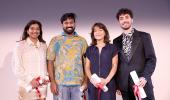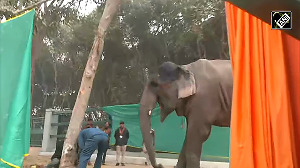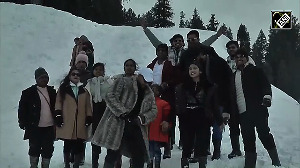'Hope is about being more accepting of each other, the kind of solidarity and friendship that even our families may not be able to give.'

Until a few weeks ago not many people in India knew Payal Kapadia's name. She had fans -- students, film journalists and film buffs who followed her 2017 short Afternoon Clouds, which played at the Cannes Film Festival's Cinéfondation section.
That lovely chamber piece about a middle-aged woman and her maid followed Kapadia's 2021 documentary A Night of Knowing Nothing, where she tracked students strikes and protests at the Film and Television Institute of India (Kapadia graduated from the FTII in 2018), and similar voices of those studying at other public funded institutions in India, including the Jawaharlal Nehru University and Jamia Milia Islamia University.
A Night of Knowing Nothing won the L'Œil d'or, the Cannes festival's top documentary award.
Then it was announced that Kapadia's surprise new film All We Imagine as Light would play in Cannes 2024's main competition section. This was the first Indian film to be selected in the main competition after a gap of three decades. The film is a co-production from India, France, The Netherlands and Luxembourg.
On May 23, 2024, All We Imagine as Light received an 8 minute-long standing ovation at its premiere screening at the Grand Theatre Lumiere.
The buzz at Cannes was strong, and two days later on May 25 evening the film won the Grand Prix -- the second highest award presented at the festival.
And now suddenly everyone is celebrating Payal Kapadia. Prime Minister Narendra D Modi congratulated her on the social media site X. Lyricist and scriptwriter Javed Akhtar congratulated Kapadia and wrote that he and Shabana Azmi would love to host her for a meal.
Meanwhile, Oscar winning sound recording Resul Pookuty posted on social media that next month Kapadia would be in court because of a lawsuit filed against her by FTII for her role in the student protests in 2015.
All We Imagine as Light is the story of three nurses in Mumbai -- two from Kerala and one from Maharashtra, their hopes, aspirations, struggles, their loves gained and lost. The film stars Kani Kusruti (Girls Will Be Girls), Divya Prabhu (Ariyppu) and Chhaya Kadam (Laapataa Ladies).
In her acceptance speech Kapadia said, "This film is about the friendship between three very different women. And often times women are pitted against each other. This the world, the way our society is designed, and that's really unfortunate. But for me friendship is an important relationship because it can lead to greater solidarity, inclusivity and empathy to each other. These are the values we should all be striving for."
Rediff.com Senior Contributor Aseem Chhabra spoke to Payal Kapadia at Cannes one day before the award ceremony where the film won the Grand Prix prize.
Hello Payal, there was something I have been meaning to ask you for some time. I am curious about the titles you give to your films. They such poetic, lyrical titles. They are lovely titles, but you never use one word.
What are the thoughts that go into it? And how do you expect audiences around the world and in India to get the titles, especially if this film will open in India?
We will use the Malayalam title in India.
Not Hindi? And what's the Malayalam title?
My Malayalam is very bad. But towards the end a man says, 'You try to imagine light, but you cannot.' That line is in the Malayalam title.
When I make films, it takes a long time. So over the years, some lines get stuck in your head. A Night of Knowing Nothing was the title of a poem. All We Imagine as Light is actually the title of one of my mother's paintings (Payal's mother Nalini Malini is the well-known painter.). It stayed with me for a long time and I thought it really resonated with my thoughts in this film. So I borrowed it from her.
It is a beautiful, perfect title.
She also has really good titles for her paintings.

In an interview you talked about a nurse from Kerala who was taking care of your grandmother. But if you looking for immigrant stories in Mumbai, why did you settle on two nurses from Kerala? Did you consider writing about cab drivers from Bihar or UP?
They are also there in the film (she laughs). When I started writing this film, I was still a student and in the final year of FTII. At that time my grandmother had a fall and there was a nurse who took care of her. But also my father was in hospital a lot.
So I was doing a lot of hospital duty, one side for my grandmother and the other side, actually in the hospital. If you look at a hospital space. It's like a microcosm for the country.
I wanted to make a film about a hospital as a space. That started as a diploma idea. I met this nurse and we talked about what it was it was like being a trainee nurse and coming to a new city.
I was at an age where I was planning to move back from Pune to Mumbai. I had this fear about going back and to be able to work in Mumbai.
You were born in Mumbai?
I was born in Mumbai, but I mostly lived out. I went to Rishi Valley School in Andhra Pradesh. Mumbai is a place that I keep coming back to. It is my home, and I would see around me my friends who were starting to work and becoming professional.
I wanted to make a film about women and working in in a city like Mumbai, which has so many contradictions. It's a place which is a little bit easier for women than many other parts of the country. But it's also a really expensive city and you can't have a comfortable life if don't have money.
This is the kind of contradiction I wanted to explore in the film. It became much more than my diploma.

I am wondering about the hope of Mumbai. Is it still there with you? Does the hope still hold at the end of the film?
The hope is about friendship. Hope is beyond the city. Hope is about being more accepting of each other, the kind of solidarity and friendship that even our families may not be able to give. I hope our friends can be that family.
You start All We Imagine as Light with what I believe are real immigrants' voiceovers. So it's very much like a documentary. And even The Night of Knowing Nothing was documentary, but it was laced with fiction.
In your new film with documentary and fiction, where does one end and where does the other form of storytelling begin?
How does it work in your mind? Do you say I will just sit down and write a fictional narrative?
That's how we started off with fiction. I did a residency in Paris and then writing in India as well. But I think I love nonfiction so much that I can't stay away from it. So it sort of crept into this film as well. And I think when you stay with the film for so long, you grow as a person. We change and film also keeps changing.
I agree. The definition of film doesn't have to be rigid, especially when you are coming from film school.
You were at FTII during troubled times.
There are always troubled times. There were protests against the fee hike. And the students went on hunger strike, demanding the fees should not be increased and the institute should be accessible to all deserving students. And it wasn't successful to some extent. But for me it is great to have so many people from my class doing well.
Maisam Ali was in my class and his film In Retreat is here at Cannes as well. And also the short film by Chidanand Naik won in the La Cinef category. He's an FTII student.

I am curious about the training you received in the film school. How rigorous was that and how did you evolve your own language as a film-maker, and a writer? At what stage did you free yourself from the school and its training?
The reason I went to FTII was because I had gone to a film festival called Experimenta India. It used to take place in Mumbai. Now it has moved to Bangalore. They would sometimes show FTII student films. So I saw these films and I thought 'What is this place where they are making such films? I have never seen films like this before.' So I wanted to go to FTII because of that.
The good thing about the school was that one did a lot of different exercises there and those exercises forced you, challenged your mind. When you have restrictions, you are able to try different things.
My nonfiction project was mostly a documentary. It was a time we were moving from celluloid to digital. The school had restrictions on the cards you could use for digital camera. It was difficult to shoot, so I started recording audio.
We planned my documentary because I knew I had one card and that became the film. So I started thinking that way, and that became my practice for the next three, four years. Sometimes there are a restriction in the film school, and you start thinking differently and try new things.
Tell me about the casting of All We Imagine as Light. You have three wonderful women actors. And you also cast Hridhu Haroon in a small role.
Casting took a lot of time. I wanted to work with people who understood the film and not just came and did their part. And I met three very unique women. It was a delight to work with them, not just because they are talented, but they are also very committed to cinema and to a project. I found it to be very collaborative, although I don't speak Malayalam.

Did you sometimes feel they had a secret language and they spoke about you?
I am sure they did (she laughs).
I also had two dialogue writers Robin Joy and Naseem. Both are Malayali. Without them I couldn't have done it. So we all worked together. And for one month before the shooting we lived together and practiced a lot.
We would do workshops and improvised a lot. We would shoot the improvised scenes and then watch them to see how we could create scenes. So on the set we were very sure how we wanted to look at the characters. For people like them to give me this much time, it was really nice, very collaborative.
I have seen Kani, Divya and Chhaya in quite a number of films and they are really committed to the art of film-making. They were obviously not just there for the money.
There was no big money in this film.
Just being selected at Cannes is such an achievement. Peter Bradshaw gave it a five-star rating in The Guardian. IndieWire barely gives any film a rating above B grade and they gave you an A.
You were hardly known in India until now. Your documentary A Night of Knowing Nothing for which I interviewed you in 2021 was barely seen in India other than at some festivals like MAMI and DIFF.
There were a lot of screenings in universities and colleges.
Yes, but I am talking about on a larger scale.
Documentaries never get released in India. But this film will be definitely released in India.
That's great. There is some minor nudity that will have to be cut.
Woh to karna hee padega. This is India. I shot those scenes in such a way that it would not affect the narrative.

But my question was more about you being on the same platform as Francis Ford Coppola. People must be wondering, who is this person?
Our film industry is really self-contained. The Tamil, Malayalam and Bengali industries have well-known film-makers. But the English media barely covers them. It's a very niche thing.
There are amazing films being made in India and the media often just focuses on the clothes the stars wear. I don't want to sound be flippant saying this, but just think that in India, there are various other landmark film-makers. So many directors are doing such good work.
There's not always a need for Western validation. And everything should exist together. Why not?
So congratulations Payal. I was so blown away by the film. I am very happy for you.
It's a dream come true. When I was in Cannes the last time, I would watch films in the competition section for fun. But this has been special.












 © 2025
© 2025